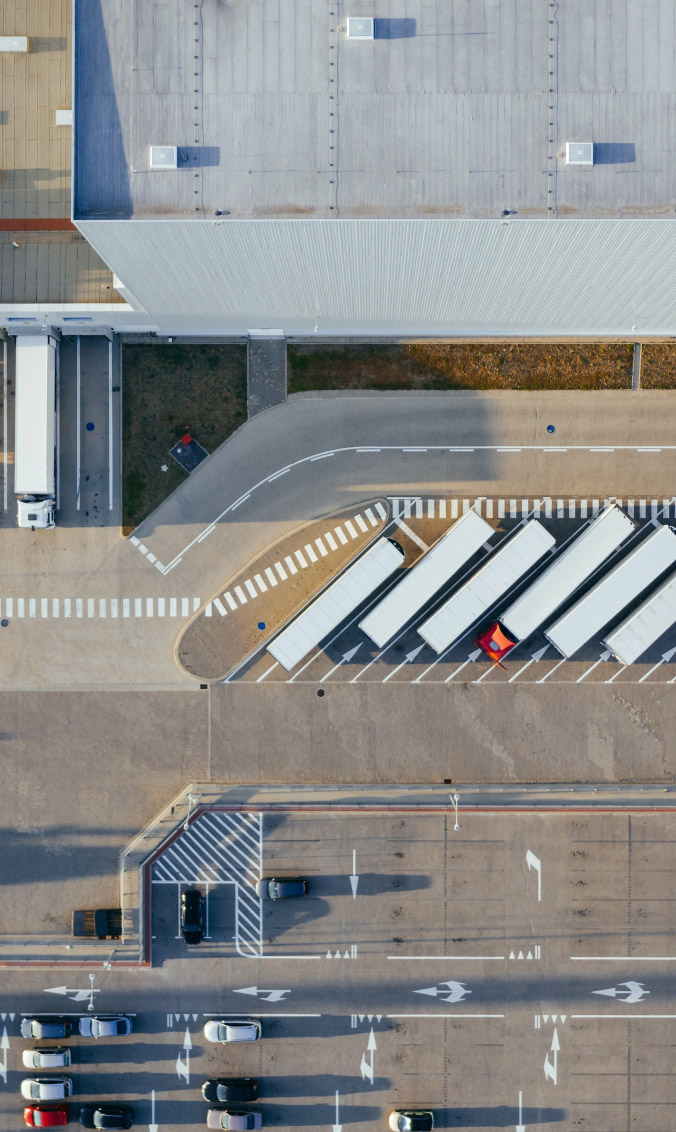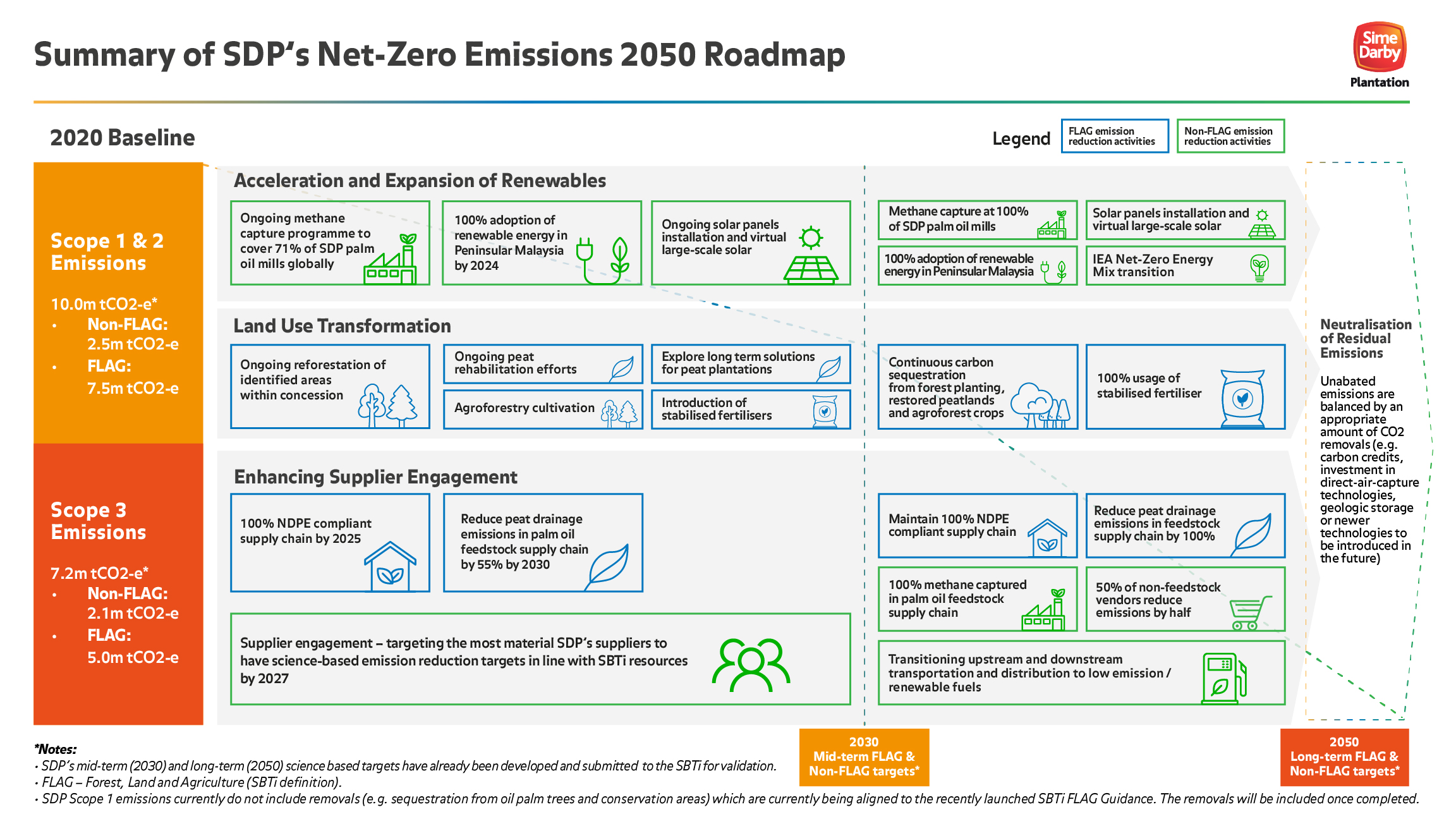To achieve Net-Zero emissions across our entire value chain,
we need to tackle GHG emissions in three different scopes.
SDP’s net-zero strategy commits to 100% absolute overall emissions reduction in Scope 1 and 2 by 2050,
with all unabated Scope 3 emissions balanced by an appropriate amount of carbon removals or offsets.
This is how we are tackling our Scope 1, 2 & 3 emissions.
Acceleration of Renewables Programme
Up to 70% of SDP’s footprint for non-FLAG (Forest, Land and Agriculture (SBTi definition)) Scope 1 and 2 emissions come from methane produced from mill effluent treatment. We will have more than 40 biogas plants across our operations by 2030, which will address much of the emissions from our mill effluent.
Accelerating Engagements with Suppliers
SDP recognises that addressing Scope 3 emissions, generated from third-party suppliers or others in the value chain, presents the greatest challenge on our Net-Zero journey. We have therefore committed to engaging suppliers in order to ensure the replication of our measures not only within our own operations but also across our entire value chain. In 2021, SDP achieved 71% compliance in our supply chain for our earlier ambition to be deforestation-free.
Land Use
Transformation
We are expanding on our existing reforestation, conservation and biodiversity initiatives. This includes reforestation of non-productive agriculture land as well as large-scale tree-planting as a nature-based solution to increase carbon sinks.
For instance, the Group has decided to reforest a 400 ha area of peat plantations in East Malaysia. To date, SDP has forest set-aside programmes of more than 40,000 ha, with over 1.9 million forest trees planted.
SDP will reinforce its No Deforestation, No Peat and No Exploitation (NDPE) commitments throughout its operations and global supply chain.
Our Roadmap to
Net-Zero
Measurable. Meaningful. Science-Based.
Readily Available Technologies
Undeveloped Technologies
Why is this Important for Our Journey to Net-Zero?
Our Scope 1 and Scope 2 emissions reduction commitments are based on readily available technologies.
Pursuing our targets based on technologies that are already available simply means more certainty in our plans to achieve Net-Zero. Available technologies used to reduce/abate GHG emissions are already proven to be effective. This alleviates any concern that we may not achieve our Net-Zero targets if any undeveloped technologies critical to achieving the targets do not materialise or perform as intended.
SDP will also continue to explore newer technologies/methods which would enable us to accelerate our reduction efforts further, and target less material sources in the future.
Confused with some of the JARGONS out there?
Can’t tell the difference between Net-Zero Emission, Net-Zero Carbon or Carbon Neutral?
Check out the glossary below:
Carbon Neutral
means that any CO2 released into the atmosphere from a company’s activities is balanced by an equivalent amount being removed.
Climate Positive
means that an activity goes beyond achieving Net-Zero carbon emissions to create an environmental benefit by removing additional carbon dioxide from the atmosphere.
Carbon Negative
means the same thing as "climate positive".
Climate Neutral
refers to reducing all GHG to the point of zero while eliminating all other negative environmental impacts that an organisation may cause.
Decarbonisation
refers to all measures through which a business sector, or an entity – a government, an organisation – reduces its carbon footprint, primarily its greenhouse gas emissions, carbon dioxide (CO2) and methane (CH4), in order to reduce its impact on the climate.
Net-Zero Carbon Emission
means that an activity releases Net-Zero carbon emission into the atmosphere. No carbon was emitted from the get-go, so no carbon needs to be captured or offset.
Net-Zero Emission
means balancing the whole amount of greenhouse gas (GHG) released and the amount removed from the atmosphere. Although this term is similar to carbon neutral, it is expanded to include more than just carbon but all greenhouse gases such as methane.
SBTi
is Science Based Target initiative. This organisation is a collaboration between the CDP, World Resources Institute (WRI), the World Wide Fund for Nature (WWF), and the United Nations Global Compact (UNGC). It independently assesses and approves companies’ Net-Zero targets. SBTi’s rigour and comprehensive scope enable companies to take meaningful steps toward accelerated decarbonisation.
Scope 1 Emissions
are GHG emissions that occur directly from sources that are owned or controlled by a company. Common examples of Scope 1 emissions include emissions from combustion in owned or controlled boilers, furnaces and vehicles or emissions from chemical production in owned or controlled process equipment.
Scope 2 Emissions
are indirect GHG emissions that resulted from the generation of purchased electricity consumed by a company. Purchased electricity is defined as electricity that is purchased or otherwise brought into the organisational boundary of the company. Scope 2 emissions physically occur at the facility where the electricity is generated.
Scope 3 Emissions
are basically all other indirect emissions (not included in Scope 2) that occur in the entire value chain of a company. Although these emissions are a consequence of a company’s activities, they occur from sources not owned or controlled by the company.




